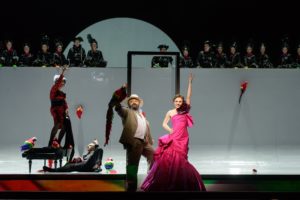
Lithuanian National Opera 2019–20 Review: Candide
One Cast Delivers ‘The Best of All Possible Worlds,’ While Other Was Not So ‘Easily Assimilated’
By Polina Lyapustina(Photo: Martynas Aleksa)
The Lithuanian National Opera opened its 100th season with a stunning premiere — Leonard Bernstein’s “Candide,” in a fully staged production for the first time in Lithuania. Directed by Vincent Boussard with Sesto Quatrini, Ričardas Šumila, and Lochlan Brown in the pit, this production will be shown during three runs before Christmas.
During the September showcase, two casts change alternated almost every day, but their shows were two completely different things.
Observant & Collaborative
Vincent Boussard brought his existing staging of “Candide” from Berlin but strictly forbade using any of the promotional materials from there. His goal was to remake it fully.
And he succeeded.
Boussard noted that collaboration was a key to his productions and every singer brought a special style to the character, so he tried to accept it and use it as an extra possibility.
Lithuanian language was used to make some hilarious remarks during the show. And every personal strength was used to make the characters stronger and more credible. And yet, all of them remained creatures of this “best of all possible worlds” of absurd.
Boussard cleverly switched the scenes inside a white box with a single door directed to the audience. Westfalia was nothing more than a hotel room with people on the walls engaging int the inquisition, parrots created Buenos Aires, and Venice was built out of psychiatric hospital beds.
It all amounted to a cohesive narrative flow.
Absolutely Indispensable
Let’s make it clear from the beginning – to sing the operetta or musical was extremely difficult for the cast, though there was one clear exception: tenor Rafailas Karpis.
He started with an amazing speech about the story of “Candide’s” production, including an impressively fast listing of creator names and sidesplitting remarks in Lithuanian. He followed the plot until his time came to reincarnate as a Governor. And then, he brought the public to confusion when they couldn’t decide if they wanted to explode with laughter or simply enjoy his incredible singing.
The Governor’s ballade “My love” was the strongest piece of the whole operetta. Karpis’ strong and technically expansive voice was sweet and full passion, but more importantly, it was very flexible. His performance of this aria impressed me more than any before.
His King-Kong, which he turned into, must be noted. The animalistic essence of the tenor coupled with his comedic talent made this scene the most mentioned in post-concert talks.
Two Completely Different Leading Men
While Rafailas Karpis was indispensable in every performance, most of the cast changed for the second show, revealing the greatest problem of “Candide” for operatic singers.
Although singers of both casts were strong enough, it became obvious that the first cast was comprised of artists who could find a natural way of singing in this unique style.
Italian Bell Enrico Casari interpreted a lovely title character in the first cast. His Candide was naive and enamored, broken and sad, scared, full of doubts, disappointed, merciful, and generous. He managed to develop his character’s emotional arc very convincingly, with many small shades and no sudden surges. His voice was soft and light and he rarely showed the power of his voice. At the same time, he was well-heard in duets with his amazing partner Margarita Levchuk and ensembles.
Meanwhile, in the second cast, young Lithuanian tenor Tomas Pavilionis simply blasted the audience with his strong darker voice and paid too much attention to making his character a naive fool during the whole performance. Yet, none of this could help to make his Candid an empathetic character.
“We Are Women”
Belorussian soprano Margarita Levchuk could easily combine the light singing with the full use of her powerful and flexible coloratura. Both vocally and artistically, there was nothing to complain about in her performance.
Her Cunegonde was simply a gem. She brought a more aggressive interpretation of “Glitter and be gay.” Her resurrected heroine is nothing as she was before. She observes her life now with a lot of self-criticisms, not a criticism of the circumstances. The performance of this aria was a masterpiece, the utter showstopper you could ever hope it would be. Levchuck’s coloratura is still developing, but it was bright, clean, and sounded highly accomplished that night. Her highest notes brought down the house and resulted in a storm of applause.
Together with her faithful companion, The Old Lady performed by Jovita Vaškevičiūtė, they made a perfect ensemble. This two voices could easily overpower the orchestra and other soloists, which made their “We are women” and “Gavotte” true masterpieces. The difference in ranges and correlation of power helped them to highlight each other.
The Old Lady’s signature “I’m so easily assimilated” was a special summons as Vaškevičiūtė was forced to dance on the table while singing. And while this limited her singing ability, it also helped her to adjust her voice to this volatile piece.
Unfortunately, the second cast could not boast such a female couple. Soprano Gunta Gelgotė brought a very smooth performance, trying to show her best all the time with neither emotional nor vocal splash for “Glitter and be gay.” Her Old Lady, Inesa Linaburgitė, had an extremely powerful mezzo-soprano, but she sounded and performed like Fricka in “Die Walküre.” The two simply didn’t look like they were on the same page.
Strong Assistance & The Absurd
Let’s not forget about the third female character Paquette, who originally had just a couple of lines. Monika Pleškytė was a treat from start to finish and gave this secondary character extra power with her great artistry; her voice also brought serious support to every ensemble.
Another character and singer worth mentioning in the first cast was the narcissistic Maximilian as performed by Steponas Zonys. With just a few lines at the beginning of the performance, he won the audience’s hearts with his pink wig and the same pink cheeks. But his finest hour came when he either accompanied The Old Lady or overpowered the orchestra and his colleagues during the last scene ensembles, bringing a fine clean bottom sound.
Liudas Mikalauskas embodied Dr. Pangloss at the opening show. The singer, who is no stranger to comedy, definitely faced some challenges adapting his bass for the musical. During “The best of all possible worlds” his attempt to turned into some kind of Willy Wonka was way more successful than his singing, but he improved by “Dear boy.” There he showed amazing vocal flexibility, easily falling to the very bottom of the range by the end of the phrases.
He also handled any patter very well. His special ability to clown around while maintaining authority is something the audience won’t tire of seeing anytime soon. His voice was dark, rich and brought a distinctive shade of weakness and sinfulness to the old philosopher.
Unfortunately, the second Dr. Pangloss was neither so funny nor could sing with the same level of class. He sounded like a young and perhaps crazy person, not the one who could lead young people or hold the entire Westfalia in hand.
Weakest Spots
No matter how good or bad soloists could adapt their voices to the new style, two other ingredients could make or ruin the premiere.
Unfortunately, the choir and orchestra were simply out of tune. The orchestra hardly mastered the fastest tempi of Sesto Quatrini, possibly affected by a lack of rehearsals with the busy musical director. Drums were the weakest during the opening night with a small improvement by the second performance.
The choir had no idea how to deal with their parts in Act one, completely ruining the Auto-de-Fa. Their Act two parts sounded just slightly better.
The premiere at the Lithuanian opera might be not the finest performance of “Candide,” but it was joyful, full of laughter and great vocal moments. It also meant a lot for the 100-year-old LNO, who is finally starting to be a part of a huge international industry and is now working more with modern directors and experimenting with styles and forms. “Candide” proved that the organization has singers of the highest class in Lithuania and is also ready to collaborate with singers from abroad.
In watching this performance, I thought about Bernstein’s love of teaching. I recalled some of his kind but critical remarks on his students’ attempts. It seemed like he enjoyed their little failures because he saw the way they would eventually master them. Leonard Bernstein valued talent, passion, courage, and zeal in his students.
I wondered if he ever had a centenary student before…



